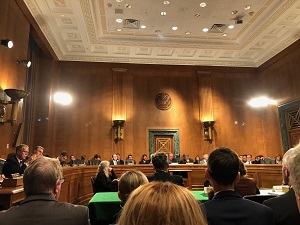Newsroom
NAFCU, CU priorities raised as regulators discuss S. 2155 implementation

A number of credit union priorities – including serving underserved communities, making exams more efficient, bolstering cybersecurity and creating a faster, real-time payments system – were discussed during yesterday's Senate Banking Committee hearing.
NCUA Chairman J. Mark McWatters testified at the hearing, which was focused on financial regulators' implementation of the NAFCU-backed Economic Growth, Regulatory Relief, and Consumer Protection Act (S. 2155). During his opening testimony, McWatters outlined the various provisions of S. 2155 that have benefitted credit unions, and also highlighted the NCUA's work to become more efficient and reduce credit unions' regulatory burden.
Responding to a question from Sen. Thom Tillis, R-N.C., McWatters elaborated on a request in his opening statement for Congress to: permit all credit unions to add underserved areas to their field of membership, and provide NCUA with examination authority over certain third-party vendors.
"Credit unions want to serve the underserved … but there's a provision in the Federal Credit Union Act that says only multiple common bond credit unions can add underserved areas," McWatters said. "Since credit unions want to serve underserved areas, it would be great if the Federal Credit Union Act was amended to let credit unions do what they want to do. Credit unions aren't subject to the [Community Reinvestment Act (CRA)] and one reason they're not subject to the CRA is that they absolutely want to extend credit to those individuals and businesses that the CRA would require them to."
Committee member Elizabeth Warren, D-Mass., recently introduced a bill that would subject credit unions to the CRA. NAFCU is strongly opposed to any efforts to wrap the industry into the CRA and has encouraged Congress to act on pending legislation, such as the NAFCU-sought Financial Services for the Underserved Act (H.R. 4665), that would allow credit unions to serve underserved communities.
On third-party vendor examination authority, McWatters argued that the NCUA should have the same authority as the other banking regulators. NAFCU supports strong cybersecurity protections, but has opposed granting NCUA such authority, arguing that granting such authority is unnecessary, costly and would not necessarily result in better supervision of credit unions.
In addition, McWatters described the NCUA's efforts to educate consumers on protecting their personal financial data and reiterated the agency's commitment to enforcing the Military Lending Act while responding to questions during the hearing.
Also during the hearing, the other witnesses – from the Office of the Comptroller of the Currency (OCC), Federal Reserve Board of Governors and Federal Deposit Insurance Corporation (FDIC) – shared their concern that cybersecurity is the banking system's main danger. NAFCU remains engaged with regulators and lawmakers to establish a strong national data security standard in order to protect consumers' data and ensure all entities that collect and store consumers' financial information are held accountable.
Watch the full hearing here.
Share This
Related Resources
CFPB Reform Issue Brief
Whitepapers
NCUA Third-Party Vendor Authority Issue Brief
Whitepapers
NAFCU's CFPB Priorities Issue Brief
Whitepapers
Data Privacy One-Pager
Whitepapers
Get daily updates.
Subscribe to NAFCU today.
